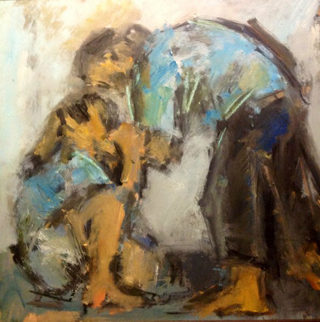For Sunday May 30, 2021
Lectionary Readings (Revised Common Lectionary, Year B)
Isaiah 6:1–8
Psalm 29
Romans 8:12–17
John 3:1–17
NOTE: Our lectionary essay this week is written by Michael Fitzpatrick. Debie is on break, and will return on June 6th.
Trinity Sunday is somewhat (in)famously known for being a day when teachers and preachers try to instruct congregations on the meaning and importance of the Trinity in Church doctrine. What such well-intentioned labors occasionally overlook is the opportunity to reflect on how we are to relate to this mysteriously wonderful three-fold Divine. The art of ascription — that is, attributing to something that which is proper to it — is a practice I think we should bring more to the center for Trinity Sunday. For what else is this day than a refounding of how we talk about the God revealed in Jesus? How can we believe in the Trinity unless it is part of how we experience the living God?
Ascription is not description. We can describe something without being invested in it, giving a disinterested, objective account. To “ascribe to the Lord,” as Psalm 29 both enjoins and models for us, is to offer unto the Holy One praises and thanksgiving because the Lord is worthy of such honor. Of course, the pastoral, Near East language of the Psalm might be a little alienating to those of us more familiar with towering skyscrapers and sprawling suburbia. Why is it praise to say that the Lord breaks the cedar trees or makes the oak trees writhe? And is there a way we can make this language our own today?
 |
|
Cedar Tree Root by Patricia Bigelow.
|
The cedar tree in the ancient Near East was both a source of pride for the tribes in the region and functioned as a metaphor for their cultural paragons. Cedar tree forests were a source of wealth, and their inclusion within the boundaries of a tribal-nation provided significant bragging rights. Consequently, the great people in a tribal-nation, especially its kings and other rulers, were seen as the “cedar trees” of their community, the embodiment of their strength and power. Without this cultural background, it’s easy to miss the subversive import of passages like Psalm 29 that the God of Israel is the one who breaks the cedar trees, who shakes the wilderness, who strips the forests bare. The ascription is a declaration that the human sources of power and wealth are mere kindling and splinters before the Advocate who acts on behalf of his people.
Moreover, ascribing to the Redeeming God glory and strength over those who are metaphorically “the cedars of Lebanon” is an act of humility itself. The way of the flesh would have us attribute “cedar tree-ness” to ourselves against those “cedar trees” who persecute us. By granting the Most High such glory alone, we affirm the equality of all people in our finite creatureliness. All are equally crying, “Glory!” But these ascriptions do not serve to assuage the ego of the Almighty. Ascription to the Lord moves us, not God, into proper relation. Recognizing who it is that sits “enthroned above the flood” connects us with the source that “gives strength to his people” and “gives his people the blessing of peace.” We ascribe to the Lord for our sakes, to place our faith and hope in the One who has true power to save.
 |
|
The Prodigal Daughter by Ghislaine Howard.
|
The ancient Israelite community lived in a world not that dissimilar from our own. It was a world where the stability and security of daily life was largely dictated by those with great material wealth or large armies at their command. Israel spent much of their first-temple existence living with extreme existential risk due to the large number of imperial nations that surrounded their tiny scrap of land. They were constantly tempted to mitigate this risk in predictably human ways: by amassing their own wealth, their own armies, or placating local deities. These futile attempts simply perpetuate sin and death in the world. The radical act of ascribing to the Lord roots our hope and security in the Creator of this world, the source of true strength.
However, our ascription of the Lord cannot rest sufficient with power and strength. For the voice of the Advocate is not heard simply in rendering asunder the might of the powerful. It is also heard within us. To be the people of the Most High is not merely to be subjects before the rightful Ruler, but to be children of God. We are internally related to our Creator, having been adopted by grace through baptism into the heavenly family. We ascribe to God “Abba, Father!”, and in so doing St. Paul tells us this voice is actually the Spirit of God speaking within us, testifying that we have been made heirs of the coming kingdom of heaven. Again, the ascription is not to satisfy God, but to properly relate us to this mysterious Parent who has made us “joint heirs with Christ.”
Still our ascription of the Lord is incomplete, for the Advocate of heaven and the Spirit testifying within us are revealed through a common link: the Christ who walked with us and through whom we obtain this eternal life as children of the Most High. To ascribe to the Lord is to specifically ascribe to Jesus what is proper to his place in our life. Our Gospel reading bears witness that no one can perform the signs and wonders that marked Jesus’ life apart from the presence of God. He is the one who descended from heaven, the only begotten Son of the Father, who was lifted up that whoever believes in him will be saved. For the Son was sent into the world not to condemn it, but to save it.
 |
|
The Winds of Change by Marleen Visser.
|
All of these ascriptions — of divine power, of baptism by the Spirit, of atonement through the Son — bring us close to the mystery of the Trinitarian God. This does not mean we understand it, and maybe these ascriptions do not serve that purpose. We ascribe for our sakes, to say what we must say about the Divine to be faithful to our experience of God’s love. Ascription changes us, for it helps us take the proper attitude and reverence towards the source of all our hope. To declare that the Holy One can break the cedar trees, that the Spirit has adopted us into the family, that the true Father gave us his only Son, is to fill out the implications of God so loving the world that
our Lord wills to save the world,
has the power to do so,
has done so on the Cross,
and as the Spirit testifies, is doing so in us.
Michael Fitzpatrick welcomes comments and questions via m.c.fitzpatrick@outlook.com
Image credits: (1) Fine Art America; (2) Ghislaine Howard; and (3) Visions Gallery.



